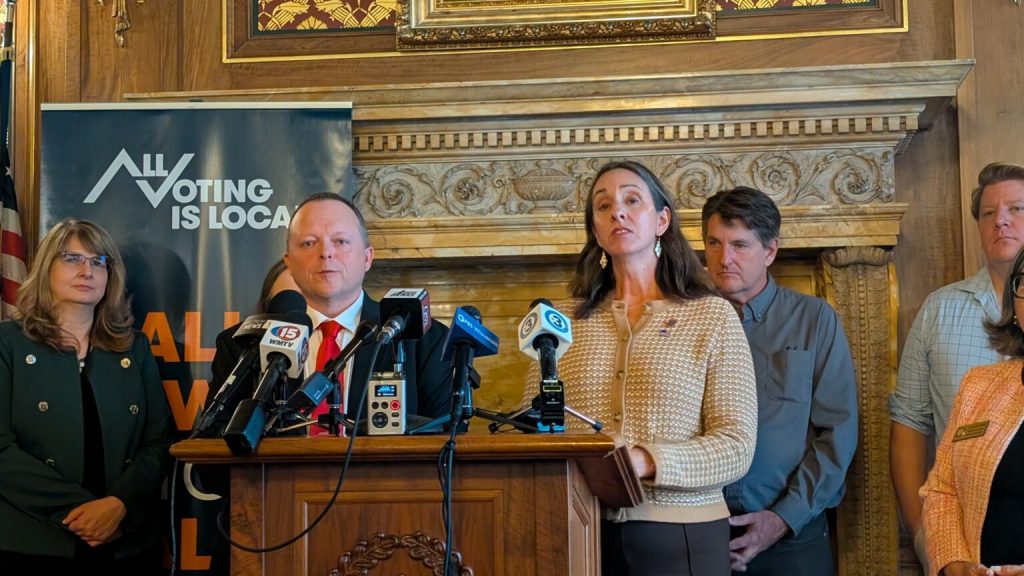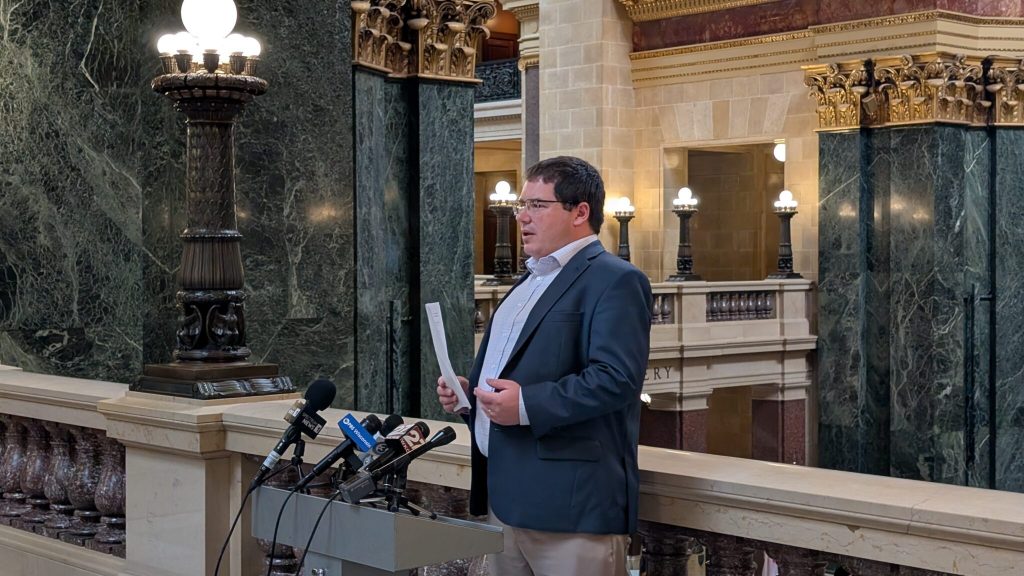Where ‘Monday Processing’ and Other Election Changes Stand
Republicans, Democrats have competing proposals, but proponents pledge to work together.

Assembly Republican and Democratic authors announced competing bills at a joint press conference last week. (Photo by Baylor Spears/Wisconsin Examiner)
Wisconsin lawmakers are once again trying to make changes to the state’s elections system, including allowing elections clerks to start processing absentee ballots the day before Election Day, though partisan divisions on how the changes should be made are already showing.
Assembly Republican and Democratic authors announced competing bills at a joint press conference last week, saying they are starting a conversation around the proposals and aim to get them done this session. It’s unclear whether those conversations will end in new laws ahead of the 2026 elections, which will include a spring Supreme Court election, a high-profile, open race for governor and state legislative races where control is up for grabs.
Krug said his proposals would help ensure three things for voters: the “person who’s voting next to them is who they say they are,” that the “person is eligible to vote” and that they know “who won the damn election before they go to bed.”
One bill, Krug said, would take a “comprehensive look at how we approach absentee voting in the state of Wisconsin.” This would include allowing for processing of absentee ballots to start on the Monday before Election Day and regulating drop boxes in Wisconsin.
“Absentee voting is here to stay, so we want to make sure that we include a process where we can actually get these results across the finish line before we go to bed,” Krug said. He added that by pairing the issue with drop boxes regulations in his new bill he hopes it will “draw all legislators to the table.”
Election clerks have called for change for years. Currently in Wisconsin, elections workers aren’t allowed to start processing absentee ballots until 7 a.m. on Election Day. This has led to extended processing times, especially in the larger cities including Milwaukee — bolstering suspicions among Republicans since 2018 about late night “ballot dumps” in Democratic cities.
Despite passing the Assembly, a bill to implement Monday processing died last legislative session due to opposition in the Senate.
In addition to reviving Monday processing, Krug promoted new standards for drop boxes.
“People who are in our communities who see drop boxes on the corner want to know if they have security, that they have standards, that they’re being used the same across the state of Wisconsin,” Krug said. “I know we don’t all agree on what those provisions and those standards should be, but we’ll have a good conversation about that.”
Another bill, Krug said, would eliminate the “ballot drawdown” process from Wisconsin statute and replace it with a process known as “risk-limiting audits.” The drawdown is used when there is a numerical discrepancy and as a result a ballot may be randomly selected and removed from the vote count.
“Clerical errors can lead to an actually legal ballot being tossed out,” Krug said. “We’ve got to get rid of the drawdown.”
Risk limiting audits are a statistically based audit technique, which audits a certain number of ballots depending on the margin of victory in a given election, has been growing in popularity in recent years, according to the National Conference of State Legislatures.
The bill language for Krug’s first two bills is not available.
Krug said AB 312, which was introduced earlier this year, is also included in his package. The bill would require absentee voting sites to be open for at least 20 hours during the period for voting absentee in-person.
“There’s going to be a limited number of session days going into the fall and spring,” Krug said, adding that it could be difficult to get “27 or 30 election bills” across the finish line individually.
While the lawmakers held their press conference jointly, Rep. Lee Snodgrass (D-Appleton) said she is not currently supportive of Krug’s bills but that having the conversation is important.
“I think it’s over bloated,” Snodgrass said about Krug’s “Monday processing” proposal. “I’d like to see a cleaner bill.”
“We are meeting the moment. Our country, and our state has never been more divided and more contentious. The partisan divide has become not just contentious, but even hostile,” Snodgrass said, adding that she and Krug want to “model that civil conversations in debate can happen in the same room, from the same podium and with the same goal in mind despite diverging ideas.”
Senate Democrat critical of Krug’s legislation
In addition to Assembly Democrats not being on board with Republican election proposals, there already appear to be some obstacles in the Senate.
While speaking to reporters after the Assembly press conference, Sen. Mark Spreitzer (D-Beloit) criticized Krug’s Monday processing proposal, saying he was “very disappointed” with the new version as it contains a “poison pills” meant to satisfy the right-wing portion of his party.

Sen. Mark Spreitzer (D-Beloit) criticized Krug’s Monday processing proposal, saying he was “very disappointed” with the new version as it contains a “poison pills” meant to satisfy the right-wing portion of his party. (Photo by Baylor Spears/Wisconsin Examiner)
“The Monday processing concept has always been a good idea on its own merits, but it’s never been about the right to vote. It has always been about efficiencies for our clerks and our election officials to process ballots more smoothly,” Spreitzer said. “None of those things are about voting rights, and I’m not willing to trade those things for undermining people’s voting rights.”
Spreitzer said the dropbox restrictions are “nonstarters” that would “functionally ban them in most communities.” A bill draft, according to VoteBeat, includes a ban on clerks fixing errors on ballots and guidelines for dropboxes, including where to place them, how to secure them, how to collect ballots and how to keep records of when they’re emptied as well as requiring they be under a continuous, livestreamed video feed.
Spreitzer said Monday processing may not happen until Democrats have control, given the recent version of the bill.
“It may mean that we need to wait for a Democratic majority to pass this,” Spreitzer said. Senate Republicans currently hold a 17-15 majority. Democrats are hoping to change that in 2026 and need to win at least two additional seats to flip control of the chamber for the first time in over 15 years.
Waiting would delay any changes to 2027 at the earliest.
Democratic bills
Snodgrass, alongside three of her Assembly Democratic colleagues, introduced proposals that have overlapping goals with Krug’s legislation last week.
Snodgrass said the Democratic package is meant to focus on “strengthening our democracy” by increasing access, educating people and providing the resources necessary to ensure that all eligible electors can vote. She said they specifically want to remove barriers to voting, not impose them.
One bill would require elected state officials to serve as poll workers during their first term and once every three years after that to help increase their understanding of the state’s election administration.
“There’s no better way of learning than doing so,” Snodgrass said, adding that the bill would help elected officials be a “voice to talk about how Wisconsin’s elections are secure.”
A pair of bills seek to ensure that polling places and voting are more accessible by requiring that election officials have one hour of voter accessibility training, and requiring election officials use the Wisconsin Elections Commission’s accessibility checklist at each polling place and uniform signs with instructions for curbside voting. Several of the bills focus on helping young people in the state participate in elections.
One bill would require that at least one special school registration deputy be present at each public high school in the state so eligible students can register to vote at school during the day. One bill would require high schools to give voter registration forms and nonpartisan voting information to students who are eligible to vote.
The Department of Public Instruction would be required, under one bill, to develop a curriculum on the electoral process and voting. The agency would also have to mandate at least one hour of voter education instruction annually for K-12 students.
“Too often, young people want to get involved, but don’t know how,” Rep. Jodi Emerson (D-Eau Claire) said. “By making voter registration and civic information part of the high school experience, we eliminate barriers and send a clear message, your voice matters, and your vote counts. This bill is not about partisanship. It’s about participation. It’s about preparing students to step confidently into adulthood, not just as graduates, but as citizens ready to shape their communities and their future.”
The package also includes a constitutional amendment proposal that would allow 17-year-olds to vote in primaries if they will be 18 by the general election. Another bill would allow 16- and 17-year-olds to preregister to vote if they turn 18 before the next election.
Where ‘Monday processing’ and other elections measures stand in Wisconsin this legislative session was originally published by the Wisconsin Examiner.
If you think stories like this are important, become a member of Urban Milwaukee and help support real, independent journalism. Plus you get some cool added benefits.






















This article said: “clerks fixing errors on ballots”. Perhaps it should have said was “errors on the mail-in envelopes”. Pretty sure nobody marks up a ballot.
Also, it certainly looks like there is a need for a class on what it means to be a citizen. It would be non partisan, of course. When I was in high school there was a class like this…Sociology or Civics?